一、点对点
1、提供者目录展示

2、导入依赖

<dependency> <groupId>org.springframework.boot</groupId> <artifactId>spring-boot-starter</artifactId> </dependency> <!-- spring boot web支持:mvc,aop... --> <dependency> <groupId>org.springframework.boot</groupId> <artifactId>spring-boot-starter-web</artifactId> </dependency> <dependency> <groupId>org.springframework.boot</groupId> <artifactId>spring-boot-starter-test</artifactId> <scope>test</scope> </dependency> <dependency> <groupId>org.springframework.boot</groupId> <artifactId>spring-boot-starter-activemq</artifactId> </dependency>
3、生产者application.yml配置文件
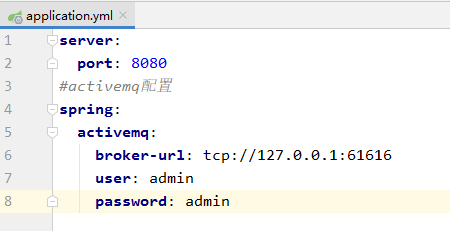
4、生产者MyProvider,通过JMSTemplate模板发送消息
package com.zn.p2p; import org.apache.activemq.command.ActiveMQQueue; import org.springframework.jms.core.JmsTemplate; import org.springframework.stereotype.Component; import javax.annotation.Resource; /** * 生产者,通过JMSTemplate模板发送消息 */ @Component public class MyProvider { //注入JMSTemplate模板 @Resource private JmsTemplate jmsTemplate; //创建方法 public void sendMessage(){ //点对点,创建队列 ActiveMQQueue queue=new ActiveMQQueue("SpringBoot_Queue"); //发送消息 jmsTemplate.convertAndSend(queue,"生产者产生的消息!"); } }
5、客户端访问ProviderController
package com.zn.p2p; import org.springframework.web.bind.annotation.RequestMapping; import org.springframework.web.bind.annotation.RestController; import javax.annotation.Resource; /** * 客户端访问的方法 */ @RestController public class ProvideController { @Resource private MyProvider provider; @RequestMapping("/sendMessage") public String sendMessage(){ provider.sendMessage(); return "sucess!!"; } }
6、provider启动类StartProvider
package com.zn; import org.springframework.boot.SpringApplication; import org.springframework.boot.autoconfigure.SpringBootApplication; @SpringBootApplication public class StartProvider { public static void main(String[] args) { SpringApplication.run(StartProvider.class,args); } }
7、消费者目录展示
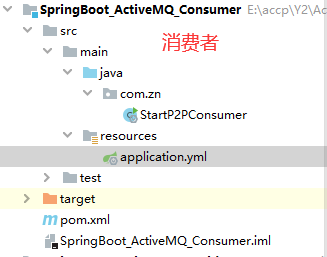
8、导入依赖

<dependency> <groupId>org.springframework.boot</groupId> <artifactId>spring-boot-starter</artifactId> </dependency> <!-- spring boot web支持:mvc,aop... --> <dependency> <groupId>org.springframework.boot</groupId> <artifactId>spring-boot-starter-web</artifactId> </dependency> <dependency> <groupId>org.springframework.boot</groupId> <artifactId>spring-boot-starter-test</artifactId> <scope>test</scope> </dependency> <dependency> <groupId>org.springframework.boot</groupId> <artifactId>spring-boot-starter-activemq</artifactId> </dependency>
9、消费者application.yml配置文件

10、consumer启动类StartP2PConsumer
package com.zn; import org.springframework.boot.SpringApplication; import org.springframework.boot.autoconfigure.SpringBootApplication; import org.springframework.jms.annotation.JmsListener; import org.springframework.jms.annotation.JmsListeners; import javax.jms.JMSException; import javax.jms.TextMessage; @SpringBootApplication public class StartP2PConsumer { public static void main(String[] args) { SpringApplication.run(StartP2PConsumer.class,args); } //消费者消费 @JmsListener(destination = "SpringBoot_Queue") public void getMessage(TextMessage message) throws JMSException { System.out.println("消费者获取到消息:"+message.getText()); } }
11、启动提供者并访问


12、启动消费者
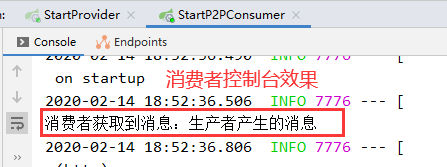
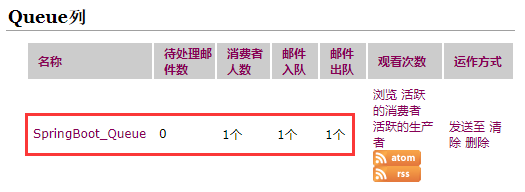
二、发布订阅
1、消费者目录展示

2、导入依赖

<dependency>
<groupId>org.springframework.boot</groupId>
<artifactId>spring-boot-starter</artifactId>
</dependency>
<!-- spring boot web支持:mvc,aop... -->
<dependency>
<groupId>org.springframework.boot</groupId>
<artifactId>spring-boot-starter-web</artifactId>
</dependency>
<dependency>
<groupId>org.springframework.boot</groupId>
<artifactId>spring-boot-starter-test</artifactId>
<scope>test</scope>
</dependency>
<dependency>
<groupId>org.springframework.boot</groupId>
<artifactId>spring-boot-starter-activemq</artifactId>
</dependency>
3、消费者application.yml配置文件
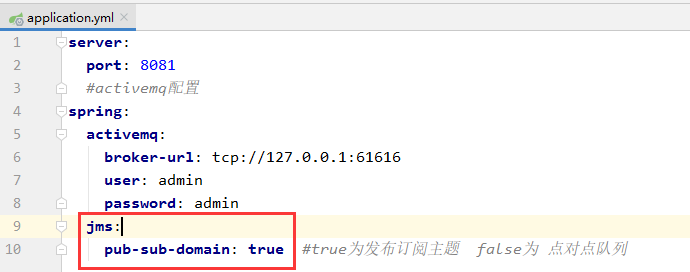
4、consumer启动类StartTopicConsumer
package com.zn; import org.springframework.boot.SpringApplication; import org.springframework.boot.autoconfigure.SpringBootApplication; import org.springframework.context.annotation.Bean; import org.springframework.jms.annotation.JmsListener; import org.springframework.jms.config.DefaultJmsListenerContainerFactory; import org.springframework.jms.config.JmsListenerContainerFactory; import javax.jms.ConnectionFactory; import javax.jms.JMSException; import javax.jms.TextMessage; @SpringBootApplication public class StartTopicConsumer { public static void main(String[] args) { SpringApplication.run(StartTopicConsumer.class,args); } //springboot默认只配置queue类型消息,如果要使用topic类型的消息,则需要配置该bean @Bean public JmsListenerContainerFactory jmsTopicListenerContainerFactory(ConnectionFactory connectionFactory){ DefaultJmsListenerContainerFactory factory = new DefaultJmsListenerContainerFactory(); factory.setConnectionFactory(connectionFactory); //这里必须设置为true,false则表示是queue类型 factory.setPubSubDomain(true); return factory; } //消费者消费 destination队列或者主题的名字 @JmsListener(destination = "SpringBoot_Topic",containerFactory = "jmsTopicListenerContainerFactory") public void getMessage(TextMessage message) throws JMSException { System.out.println("消费者获取到消息:"+message.getText()); } }
5、提供者目录展示
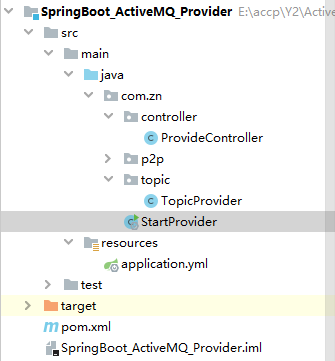
6、导入依赖

<dependency>
<groupId>org.springframework.boot</groupId>
<artifactId>spring-boot-starter</artifactId>
</dependency>
<!-- spring boot web支持:mvc,aop... -->
<dependency>
<groupId>org.springframework.boot</groupId>
<artifactId>spring-boot-starter-web</artifactId>
</dependency>
<dependency>
<groupId>org.springframework.boot</groupId>
<artifactId>spring-boot-starter-test</artifactId>
<scope>test</scope>
</dependency>
<dependency>
<groupId>org.springframework.boot</groupId>
<artifactId>spring-boot-starter-activemq</artifactId>
</dependency>
7、TopicProvider
package com.zn.topic; import org.apache.activemq.command.ActiveMQQueue; import org.apache.activemq.command.ActiveMQTopic; import org.springframework.jms.core.JmsTemplate; import org.springframework.stereotype.Component; import javax.annotation.Resource; /** * 生产者,通过JMSTemplate模板发送消息 */ @Component public class TopicProvider { //注入JMSTemplate模板 @Resource private JmsTemplate jmsTemplate; //创建方法 public void sendMessage(){ //发布订阅,创建主题 ActiveMQTopic topic=new ActiveMQTopic("SpringBoot_Topic"); //springboot默认是queue jmsTemplate.setPubSubDomain(true); //发送消息 jmsTemplate.convertAndSend(topic,"生产者产生topic的消息"); } }
8、ProvideController
package com.zn.controller; import com.zn.p2p.MyProvider; import com.zn.topic.TopicProvider; import org.springframework.web.bind.annotation.RequestMapping; import org.springframework.web.bind.annotation.RestController; import javax.annotation.Resource; /** * 客户端访问的方法 */ @RestController public class ProvideController { //topic调用 @Resource private TopicProvider topicProvider; @RequestMapping("/sendMessage") public String sendMessage(){ topicProvider.sendMessage(); return "success"; } }
9、启动消费者订阅消息
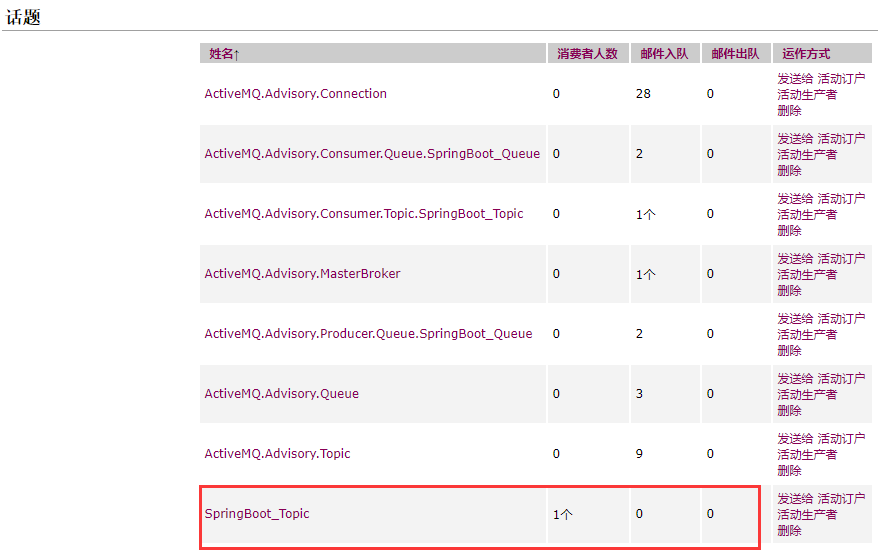
10、启动生产者

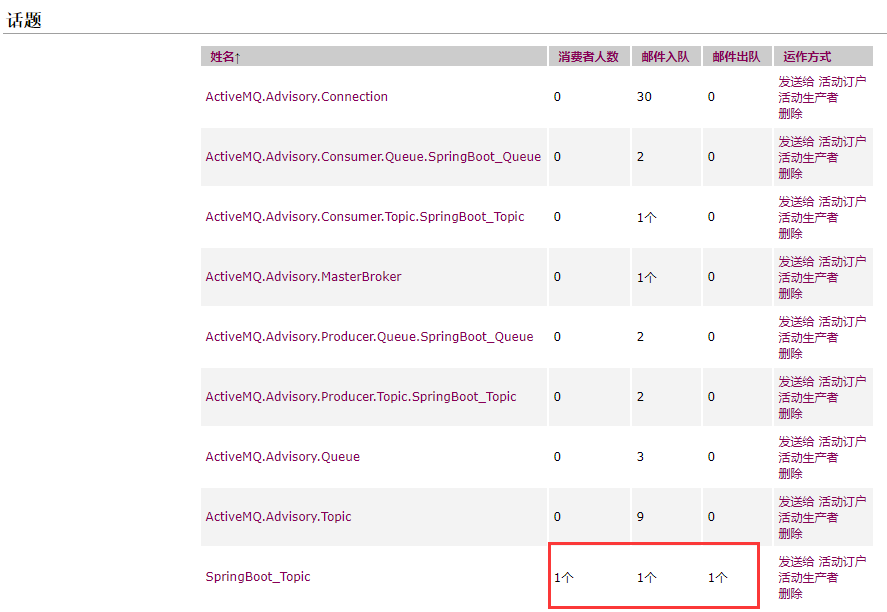
11、消费者控制台效果

三、SpringBoot整合ActiveMQ开启持久化---队列持久化
1、步骤1、2、3同上p2p
4、生产者MyProvider,通过JMSTemplate模板发送消息
package com.zn.p2p; import org.apache.activemq.command.ActiveMQQueue; import org.springframework.jms.core.JmsTemplate; import org.springframework.stereotype.Component; import javax.annotation.Resource; /** * 生产者,通过JMSTemplate模板发送消息 */ @Component public class MyProvider { //注入JMSTemplate模板 @Resource private JmsTemplate jmsTemplate; //创建方法 public void sendMessage(){ //开启持久化 jmsTemplate.setDeliveryMode(2); jmsTemplate.setExplicitQosEnabled(true); jmsTemplate.setDeliveryPersistent(true); //点对点,创建队列 ActiveMQQueue queue=new ActiveMQQueue("SpringBoot_Queue"); //发送消息 jmsTemplate.convertAndSend(queue,"生产者产生的消息"); } }
5、步骤5、6、7、8、9、10同上
11、开启生产者



12、开启消费者
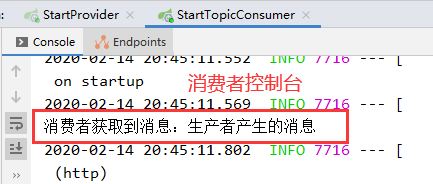

这里可以试一下让ActiveMQ服务器宕机,然后让服务器重启,看看数据有没有做持久化的操作
13、结论:当服务器宕机,重启服务器之后,没有被消费的消息依然在数据库中,这样就做到了持久化操作。
四、SpringBoot整合ActiveMQ开启持久化---主题持久化
不会进行数据消费的,但是数据可以持久化
1、步骤1、2、3同上
4、consumer启动类StartTopicConsumer
package com.zn; import org.springframework.boot.SpringApplication; import org.springframework.boot.autoconfigure.SpringBootApplication; import org.springframework.context.annotation.Bean; import org.springframework.jms.annotation.JmsListener; import org.springframework.jms.config.DefaultJmsListenerContainerFactory; import org.springframework.jms.config.JmsListenerContainerFactory; import org.springframework.jms.listener.DefaultMessageListenerContainer; import javax.jms.ConnectionFactory; import javax.jms.JMSException; import javax.jms.Session; import javax.jms.TextMessage; @SpringBootApplication public class StartTopicConsumer { public static void main(String[] args) { SpringApplication.run(StartTopicConsumer.class,args); }
@Bean(name = "topicListenerFactory") public JmsListenerContainerFactory<DefaultMessageListenerContainer> topicListenerFactory(ConnectionFactory connectionFactory){ DefaultJmsListenerContainerFactory factory = new DefaultJmsListenerContainerFactory(); factory.setSubscriptionDurable(true);// Set this to "true" to register a durable subscription, factory.setClientId("A"); factory.setConnectionFactory(connectionFactory); return factory; } //消费者消费 destination队列或者主题的名字 @JmsListener(destination = "boot_topic",containerFactory = "topicListenerFactory") public void getMessage(TextMessage message, Session session) throws JMSException { System.out.println("消费者获取到消息:"+message.getText()); } }
9、步骤5、6、7、8同上
10、启动消费者
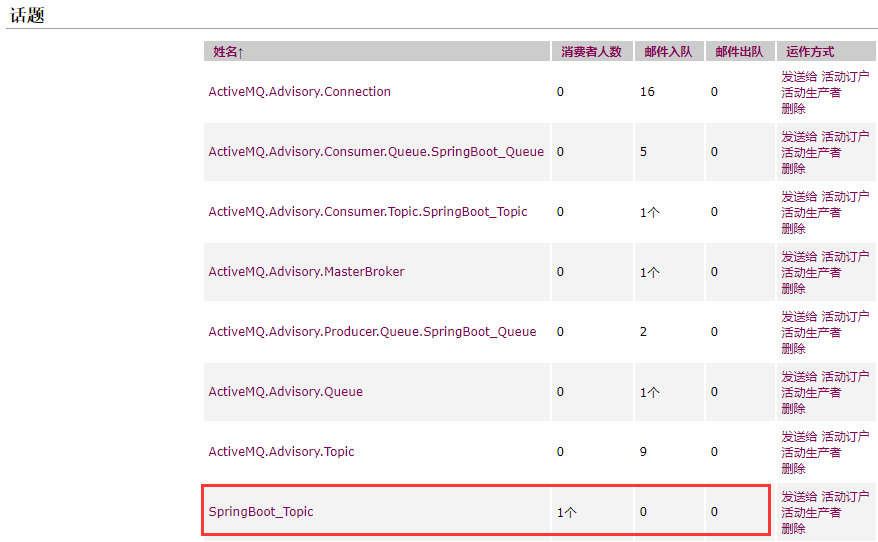
11、启动生产者

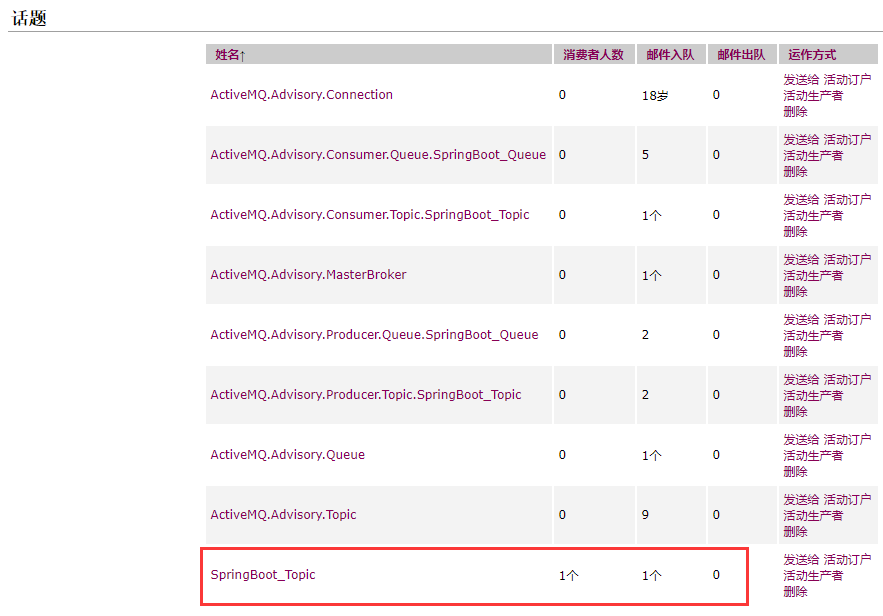

12、消费者控制台






